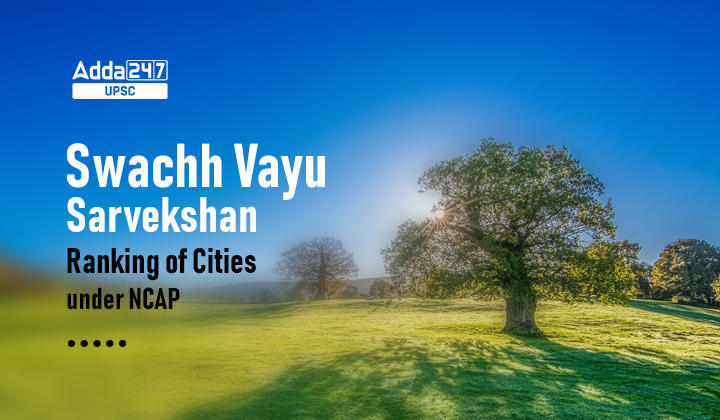Table of Contents
Swachh Vayu Sarvekshan- Relevance for UPSC Exam
- GS Paper 3: Environment- Conservation, environmental pollution and degradation.
Swachh Vayu Sarvekshan in News
- Recently, guidelines on ‘Swachh Vayu Sarvekshan- Ranking of Cities’ were released under National Clean Air Programme (NCAP) at National Conference of Ministers of Environment, Forest and Climate Change.
Swachh Vayu Sarvekshan
- About: Swachh Vayu Sarvekshan promotes ranking of 131 cities in the country for implementing City Action Plans prepared as part of National Clean Air Programme (NCAP) for reducing air pollution upto 40% by 2025-26.
- Associated Ministry: Minister for Environment, Forest and climate Change (MoEFCC) will launch and see overall implementation of Swachh Vayu Sarvekshan Ranking of Cities.
- Categories: 131 cities are categorized into three groups based on population in the Swachh Vayu Sarvekshan Ranking.
- 47 cities are in the first group having population more than 10 lakh.
- 44 cities are in the second group having population between 3 to 10 lakh.
- Third group consists of 40 cities having population less than 3 lakh.
Ranking Method for Swachh Vayu Sarvekshan
- Under Swachh Vayu Sarvekshan, Cities are required to do the self-assessment as per the framework provided on PRANA online portal. This assessment is carried out annually.
- Cities have to report implementation of activities and measures taken in respect of solid waste management, road dust management, management of construction and demolition waste, control of vehicular emissions and industrial pollution.
Importance of Swachh Vayu Sarvekshan City Ranking
- Swachh Vayu Survekshan 2022 Ranking provides a tool to cities to plan their actions in order to improve the air quality.
- Swachh Vayu Sarvekshan City Ranking is not based on the measurement of the air quality parameters to rank the cities.
- It is based on the actions taken by the cities to improve the air quality in different domains.
- The actions taken by the cities would result in the improvement of air quality.
- It thus, provides a planning implementation tool to improve the air quality and the assessment of the cities regarding how better they have aligned their actions to improve the air quality.
National Conference of Environment Ministers
- Themes: National Conference of Environment Ministers was organized under six themes with topics focusing on-
- LiFE and Combating Climate Change (Updating State Action Plans on Climate Change for Mitigation of Emissions and Adaptation to Climate Impacts);
- PARIVESH (Single Window System for Integrated Green Clearances);
- Forestry Management;
- Prevention and Control of Pollution;
- Wildlife Management;
- Plastics and Waste Management.
- Participation: The Ministers of Environment, Forest and Climate Change from across the country participated in the National Conference of Environment Ministers.
- State Forest and Environment Ministers, the concerned State Secretaries as well as Chairmen of State PCBs / PCCs along with PCCFs also participated in the two-day National Conference of Ministers’ of EF&CC.
Swachh Vayu Diwas- International Day of Clean Air for Blue Skies
Swachh Vayu Diwas- International Day of Clean Air for Blue Skies




 TSPSC Group 1 Question Paper 2024, Downl...
TSPSC Group 1 Question Paper 2024, Downl...
 TSPSC Group 1 Answer key 2024 Out, Downl...
TSPSC Group 1 Answer key 2024 Out, Downl...
 UPSC Prelims 2024 Question Paper, Downlo...
UPSC Prelims 2024 Question Paper, Downlo...




